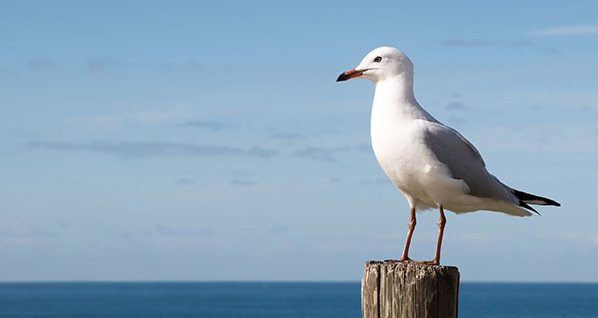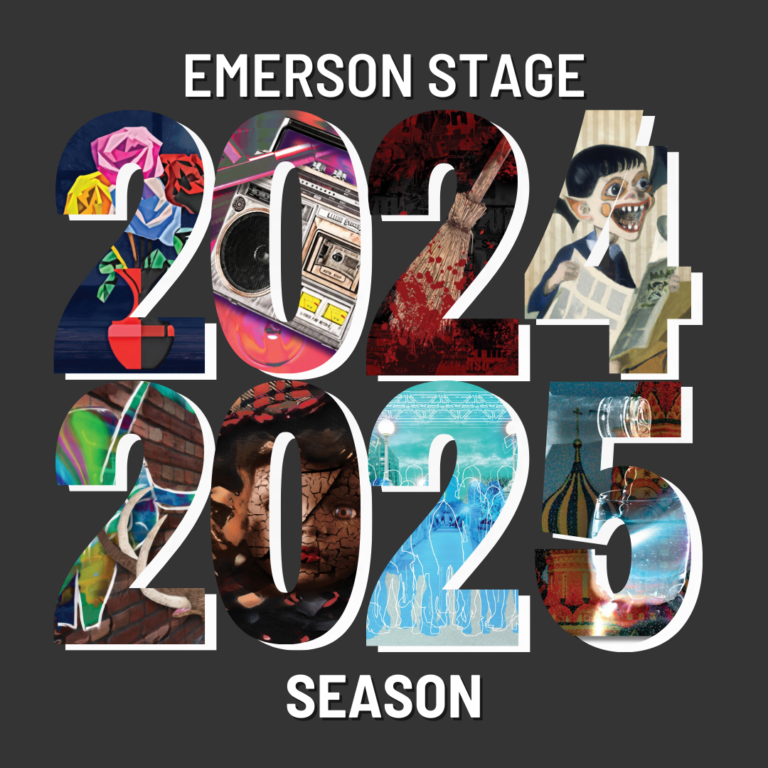Some Famous Avian Flights and Failures: A Tour Through Some of the Most Colorful Adaptations of The Seagull
By James La Bella (Dramaturg for Emerson Stage’s 2019 production of Stupid Fucking Bird)
Initial critical disdain has been something of a badge of honor for The Seagull and its descendants since the original, disastrous St. Petersburg premiere in 1896. Since then, it seems that few productions of Chekhov’s masterwork about a group of generationally-clashed artists on a Russian estate have managed to universally please critics and audiences alike. That is, until Aaron Posner’s Stupid Fucking Bird sprouted up at D.C’s Wolly Mamoth Theater in 2013.
As production dramaturg on Emerson’s Stage’s Stupid Fucking Bird, one of my greatest pleasures has been investigating just what about Aaron Posner’s script made (and continues to make) it a commercially successful adaptation of The Seagull. This work naturally also involves an investigation into some of the failed adaptations of the piece and the speculation of why exactly these productions failed.
And what an iconic deep-dive it has been.
From Penguins to Tennessee Williams to Runaway Trucks, nary a Seagull adaptation has escaped the Met-Gala-happy label of camp. In anticipation of Emerson Stage’s production of Stupid Fucking Bird, I’d like to invite you on a tour of the arresting history of some of the lesser-well-received adaptations of The Seagull, so that you might receive our production with a richer understanding of the penguin-filled ashes from which Stupid Fucking Bird, like a foul-mouthed phoenix, gracefully arose.
1. The Notebook of Trigorin by Tennessee Williams

The Take: Williams wrote The Notebook of Trigorin while he was a visiting artist at the University of British Columbia. The piece is a loose adaptation of The Seagull, maintaining largely the same characters, plot, and Russian location. The most significant changes involve the now-bisexual character of Trigorin, the newfound nastiness of Doctor Dorn, and the partial-madness of Arkadina at the end of the play. Lynn Redgrave headlined the American Premier of The Notebook of Trigorin as Arkadina. Although not in the final cut of the script, the original opening scene had Masha responding to the famous “Why do you always dress in black?” with a Williams-esque “Do I?”
My Take: Combining two of history’s most stylistically specific playwrights may have been too much icing on the proverbial cake. “What if Tennessee Williams further complicated Chekhov” is a request that, simply put, nobody has ever made. The increased focus on melodrama dried the production of the Chekhovian nuance and Russian philosophy of dramatic simplicity that made the original Seagull soar. In a similar vein, because it was not 2019, scholars did not react kindly to the newfound expansive sexuality of Trigorin. The deteriorating mental health of Tennesse Williams at the time of this play’s conception further sullied matters, resulting in a script that is occasionally poignant, but primarily a bastardization of both playwrights’ fine work.
The Take-Away: The Notebook of Trigorin had a troubled writing process and tepid premiere in Vancouver. It became a “lost” play during Maria St. Just’s control of the Williams Estate after his death. The rights for the play were released after her death and the play received its American premiere in 1996 at the Cincinnati Playhouse in the Park. This premiere was similarly received with mixed-to-negative reviews, and The Notebook of Trigorin became generally relegated to Provincetown’s Tennessee Williams Festival and the footnotes of theses of Chekhov-happy grad students.
2. Birds of Paradise by Winnie Holzman and David Evans

The Take: Winnie Holzman (book writer of Wicked) wrote Birds of Paradise with David Evans while they were in the Grad Program at NYU. The musical reimagines the story as taking place in a local community theater attempting to stage a radical retelling of The Seagull. The characters and the parts they’re playing become confused as the play-within-a-play is rewritten and soon taken over by a famous director. Notably, Birds of Paradise has a significantly more optimistic ending than its source material. The original Off-Broadway production of Birds of Paradise was miraculously directed by Arthur Laurents and included a myriad of soon-to-be famous actresses: Donna Murphy, Barbara Walsh, and Mary-Beth Piel.
My Take: This production sees Masha’s name changed to ‘Hope’ and doesn’t that just say it all? Birds of Paradise 90’s musical-theater optimism and off-off-Broadway sense of humor elevate The Seagull into pure Jawbreaker-level storytelling. This is the fun that both ruined the original production and allowed it to gain a posthumous cult following. Of the adaptations of The Seagull, Birds of Paradise is the most ready to acknowledge that Chekhov’s original piece was, in fact, a comedy. How successfully it modernized this idea is up for debate, but it’s hard to deny that the production’s most rapturous moments come in the form of David Evan’s occasionally haunting, french horn-heavy score. In fact, there is something Chekhovian about moments of haunting melody emerging from an otherwise frothy musical comedy. And perhaps that was the point all along.
The Take-Away: The show notoriously flopped and closed after twenty-four performances. Despite the poor reception, funds were raised to record a cast album, and the show enjoyed several regional productions and off-off-Broadway revivals, most recently in 2019 at 54 Below. It remains a ‘cult favorite’ for its somewhat absurd concept and joyful execution.
3. Drowning Crow by Regina Taylor

The Take: Regina Taylor’s adaptation of The Seagull transports the action to the Sea Islands off the coast of South Carolina. It’s one of the first adaptations to recontextualize the structure of The Seagull through an intersectional understanding of race. The play, saturated with modernized references and allusions to other works, updates the characters for the time. Konstantine becomes C-Trip, a performance artist. The nail in the coffin for Nina’s acting career is her taking a bus-and-truck tour of RENT. Superimposed over the action of the play is the notion black artists reckoning with their portrayal in media.
My Take: Unfortunately, Drowning Crow emerged at a time where America was becoming tired of meta-saturation. Not unlike the atrophy of the Scream franchise, the show was rejected by an audience growing tired of media that purported to know more than they did. The show succeeded most in the intelligent intersectional perspective it brought to a formerly white-centric play, but like the Williams adaptation, its moments of poignancy became muddled in the extensive decoration of the original structure.
The Take-Away: The play enjoyed a luke-warm premiere at the Goodman Theater in Chicago, but was ultimately panned in New York. Critics particularly honed in on the saturation of references and abrasive visual effects. Drowning Crow has seen several regional productions since, but there has been no movement towards a major revival. The time-specific nature of the references in the play means the piece will become ‘period’ sooner rather than later.
4. Days and Nights by Christian Camargo

The Take: Days and Nights relocates The Seagull to a 1984 Memorial Day weekend in rural New England. The plot centers more heavily on the two feuding relationships of the original play, and changes the medium of interest from theater to film and television. This version of the story sees Peter (Trigorin) accidentally hitting Eva (Nina) with a truck and killing her at the end of Act III, making the Nina/Konstantine reunion in Act IV a ghostly hallucination. The film updates the avian figure from seagull to bald eagle, and centers a Reagan speech about the Berlin Wall. The plot also appropriates elements of The Cherry Orchard, with a subplot involving the selling of the estate to land developers.
My Take: An uneven but beautifully shot adaptation, Days and Nights vacillates between boring and ridiculous—which is in itself a little Chekhovian. Certainly the talents of Cherry Jones and Allison Janney don’t hurt the piece, but the bizarre Reagan discourse and film-centric updates all feel a bit too ‘mad-libs’ to effectively land. These new elements, along with the ‘Cherry Orchard’ plot, all seem to point to a thoughtful re-mixing of the original play, but the commentary is either too confused to understand or nonexistent. Further, lingering on the melodrama of the piece (and particularly of the ending) too far strays from the ‘quiet desperation’ of the original piece.
The Take-Away: Days and Nights holds the rare distinction of having a zero-percent on Rotten Tomatoes. It was critically panned by audiences and critics alike, and remains Camargo’s only directing credit to date. For better or worse, it stands as perhaps the only adaptation of The Seagull to see Nina get hit by a truck.
And one flight… 5. Stupid Fucking Bird by Aaron Posner

The Take: Aaron Posner wrote Stupid Fucking Bird on a commission from the Wolly Mammoth Theater Company in Washington D.C. His play modernizes the characters, plot, and language of The Seagull while leaving the specifics of the story (time, location, etc.) vague. What results is an irreverent and stripped-bare retelling of the piece with a modernized sense of humor. Like Birds of Paradise, Stupid Fucking Bird was written with a keen awareness that Chekhov did indeed subtitle The Seagull ‘A Comedy.’ Rebecca Bradshaw’s production at Emerson Stage honors Posner’s humor, the depth and darkness of the original piece, and seeks to queer our understanding of the Konstantine/Nina relationship as it has been formerly played out in history.
Your Take: Critics and audiences praised the simplicity and wit of Posner’s script, but you’ll have your very own chance to receive this re-telling of The Seagull September 26 through 29 in the Jackie Liebergott Black Box Theater. Consider where other adaptations have flown and failed, and how this adaptation measures up against the vivid history of adaptations past.
Stupid F##king Bird runs September 26 through 29 in the Jackie Liebergott Black Box Theater in the Paramount Center. Tickets are $12 for the general public and $8 for the Emerson community at emersontheatres.org


